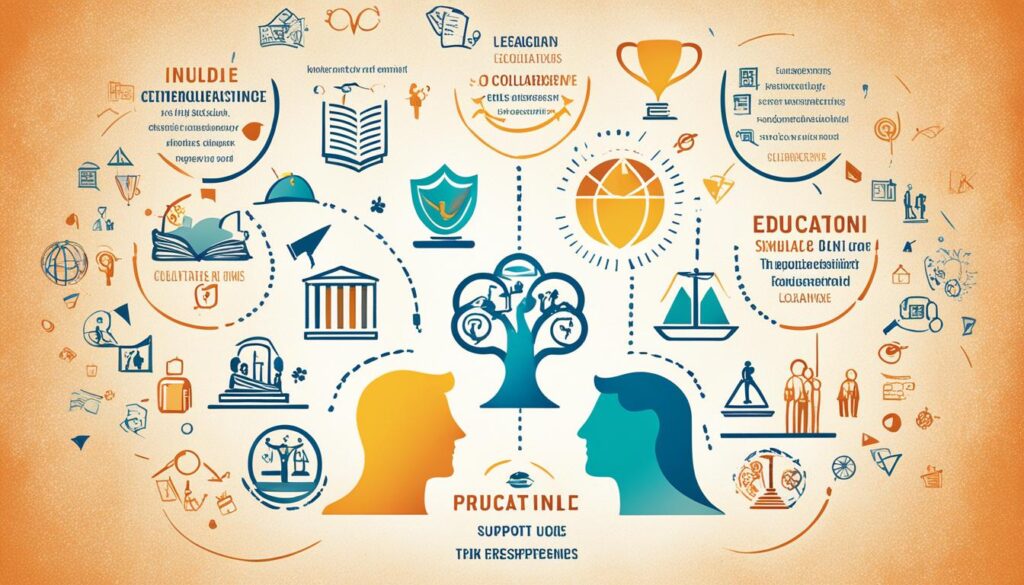Welcome to our comprehensive guide on trustworthy law support in education. In this article, we will explore the essential role of legal services in the education sector and provide valuable insights into education law support, resources, and consultations. As trusted partners in education, we understand the complexities of navigating education laws and the importance of compliance to ensure the success of schools and students.
Education law support plays a crucial role in providing legal advice, advocacy, and guidance to schools, educators, and administrators. Whether it’s understanding complex education laws, ensuring compliance with regulations, or staying updated on the latest legal developments, education law attorneys and consultants provide invaluable support to the education community.
With our collective expertise and experience, we are committed to empowering schools and educators with the knowledge and resources needed to navigate the legal landscape effectively. By understanding education laws and compliance requirements, educational institutions can foster safe and inclusive environments that prioritize student well-being and success.
Key Takeaways:
- Educational institutions rely on trustworthy law support for legal guidance and assistance in navigating education laws.
- Legal services for education encompass advice, advocacy, and resources to ensure compliance and support school success.
- Educators can benefit from education law consultations and access to up-to-date information on legal developments.
- Understanding education laws and compliance requirements is crucial to creating safe, inclusive, and supportive school environments.
- Collaboration between legal professionals and educators is essential for achieving compliance and protecting the rights of students and schools.
Understanding the Role of Trust in Legal Support for Education
In the field of education, trust plays a vital role in ensuring effective legal support. Trust forms the foundation of collaborative relationships between educators and legal professionals, enabling them to work together towards a common goal. By understanding and nurturing trust, schools can benefit from legal advocacy that protects their rights and fulfills their responsibilities.
Building a Collaborative Relationship Between Educators and Legal Professionals
Building a collaborative relationship between educators and legal professionals is essential for effective legal support in the education sector. Open communication, shared goals, and a mutual understanding of each other’s roles and expertise foster trust and facilitate a productive partnership. By working together, educators and legal professionals can navigate the complex landscape of education laws, compliance, and regulations.
The Importance of Confidence in Legal Advocacy for Schools
Confidence in legal advocacy is crucial for schools to assert their rights and advocate for their needs. When schools have confidence in their legal professionals, they can trust that their interests will be represented diligently. This confidence empowers schools to address legal challenges, resolve disputes, and ensure compliance with education laws. It also provides reassurance to educators, students, and parents, creating a supportive and secure educational environment.
The Importance of Safe and Inclusive School Climates
Creating safe and inclusive school climates is crucial for the well-being and success of students. When students feel safe, supported, and included in their school environment, they are more likely to thrive academically, socially, and emotionally. As educational professionals, it is our responsibility to foster a positive school environment that ensures every student feels valued and respected.
Guiding Principles for a Positive School Environment
There are several guiding principles that contribute to a positive and inclusive school environment:
- Fostering a sense of belonging: Students should feel a sense of connection and belonging within their school community. This can be achieved by promoting inclusivity, celebrating diversity, and creating opportunities for meaningful engagement.
- Supporting social and emotional well-being: It is essential to address students’ social and emotional needs in order to create a safe and supportive school climate. By implementing programs and initiatives that promote positive mental health, encourage healthy relationships, and teach conflict resolution skills, we can lay the foundation for a thriving school community.
- Encouraging active participation: Students should be actively involved in decision-making processes that affect their school experience. By fostering a culture of collaboration and involving students in shaping school policies, we empower them to take ownership of their education and develop a sense of responsibility.
- Promoting respect and empathy: Teaching and modeling values such as respect, empathy, and compassion are essential in creating an inclusive school environment. By emphasizing the importance of treating others with kindness and understanding, we can foster a culture of acceptance and mutual respect.
Implementing these guiding principles requires a collective effort from educators, administrators, parents, and the entire school community. By working together, we can create a positive and nurturing environment that supports the well-being of all students.
Implementing Evidence-Based Strategies for Well-Being
To promote the overall well-being of students, it is important to implement evidence-based strategies that address their social, emotional, physical, and mental health needs. These strategies should be grounded in scientific research and proven to be effective in improving student outcomes.
| Strategy | Description |
|---|---|
| Positive behavior interventions and supports (PBIS) | Implementing a system-wide approach to promote positive behavior, teach social skills, and provide targeted interventions when needed. |
| School counseling programs | Ensuring that every student has access to comprehensive counseling services that address their academic, career, and personal/social development. |
| Social-emotional learning (SEL) | Integrating SEL curriculum and practices into daily instruction to develop students’ social and emotional skills, including self-awareness, self-management, social awareness, relationship skills, and responsible decision-making. |
| Bullying prevention programs | Implementing evidence-based programs that raise awareness about bullying, foster a safe and respectful school environment, and provide support for students affected by bullying. |
| Mental health support services | Providing access to mental health professionals, counseling services, and resources to address students’ mental health needs and support their emotional well-being. |
By incorporating these evidence-based strategies into our educational practices, we can create a school climate that promotes the holistic well-being of all students.
Championing Social and Emotional Learning Through Legal Frameworks
In today’s educational landscape, championing social and emotional learning has become a crucial aspect of holistic student development. Schools play a vital role in fostering students’ social and emotional skills, which are essential for their overall well-being and future success. To ensure that these initiatives are effectively implemented, legal frameworks are necessary to provide a strong foundation and guidance.

Legal Provisions for Holistic Student Development
Legal provisions for holistic student development serve as the backbone of social and emotional learning initiatives in schools. These provisions outline the rights and responsibilities of schools, students, and other stakeholders in creating a positive and supportive learning environment. They encompass various aspects, including curriculum development, teacher training, school policies, and student support services.
One example of such provisions is the Every Student Succeeds Act (ESSA), which emphasizes the importance of well-rounded education and encourages schools to prioritize social and emotional learning. ESSA provides schools with the flexibility to incorporate these skills into their curriculum, ensuring that students have the opportunity to develop crucial life skills alongside academic knowledge.
Moreover, legal frameworks also address the need for inclusive education that supports the development of all students, regardless of their backgrounds or abilities. These frameworks promote diversity, equity, and inclusion, ensuring that every student has equal access to social and emotional learning opportunities.
Supporting Mental Health Needs with Education Law Compliance
One of the key aspects of championing social and emotional learning is supporting the mental health needs of students. Education law compliance plays a vital role in ensuring that schools have the necessary resources, policies, and practices to address students’ mental health effectively.
By complying with education law regulations, schools can create a safe and supportive environment that promotes positive mental health. This includes implementing strategies to prevent bullying and harassment, providing access to mental health services, and supporting students with individualized education plans.
Additionally, education law compliance enables schools to collaborate with external organizations and agencies to provide comprehensive mental health support. It ensures that schools have the necessary partnerships and resources to address and respond to students’ mental health challenges effectively.
In conclusion, legal frameworks are instrumental in championing social and emotional learning in educational settings. They provide the necessary structure and guidance for schools to develop holistic student development programs and support the mental health needs of students. By complying with education law regulations, schools can ensure that every student has access to a safe, inclusive, and supportive learning environment.
Advancing Equity and Fairness in Education Law
In today’s society, advancing equity and fairness in education is of utmost importance. Education law plays a vital role in promoting equality and ensuring that every student has equal access to education. By addressing discriminatory practices, protecting the rights of marginalized students, and ensuring fair treatment, education law serves as a powerful tool in creating a more just and inclusive educational system.
One area where education law plays a crucial role is in combating disparities in educational opportunities. It works to eliminate barriers that hinder students from marginalized communities, such as racial and ethnic minorities, low-income families, and students with disabilities, from receiving a quality education. Through legislation and legal frameworks, education law promotes fairness by advocating for equitable allocation of resources, inclusive curriculum, and opportunities for educational success for all students.
Another significant aspect of education law is its focus on eliminating discrimination and promoting equal rights. It prohibits any form of discrimination based on race, color, national origin, sex, disability, or any other protected characteristic. Education law ensures that students are protected from discriminatory practices, such as unequal treatment, harassment, and denial of services. By holding educational institutions accountable for providing equal opportunities to diverse student populations, education law serves as a safeguard for equity.
“Education is the most powerful weapon which you can use to change the world.” – Nelson Mandela
Education law also plays a crucial role in addressing systemic issues that contribute to inequities in education. It focuses on policies and practices that perpetuate disparities and actively works towards dismantling them. Through legal advocacy, education law aims to challenge discriminatory policies, ensure fair and unbiased disciplinary practices, and promote inclusive educational environments.
Promoting fairness in education law involves creating policies and procedures that uphold the rights of all students. It includes safeguarding the rights of students with disabilities to receive appropriate educational support and services, protecting the rights of English language learners to access quality education, and ensuring that students facing socio-economic challenges have equal opportunities for success.
| Aspect | Impact |
|---|---|
| Equal Access to Education | Ensuring that all students have equitable access to quality education, regardless of background or circumstances. |
| Eliminating Discrimination | Addressing and prohibiting discriminatory practices in education, ensuring that all students are treated fairly and equally. |
| Challenging Systemic Inequities | Advocating for policies and practices that promote fairness and dismantle systemic barriers to educational opportunities. |
| Protecting Student Rights | Safeguarding the rights of students with disabilities, English language learners, and marginalized students, ensuring they receive the necessary support and accommodations. |
Education law serves as a powerful tool in advancing equity and fairness in educational settings. Through its provisions and legal frameworks, it strives to create inclusive and just learning environments where all students can thrive and reach their full potential.
Education Law Support Services for Diverse Learning Communities
In our commitment to providing comprehensive legal support, we recognize the diverse needs and challenges faced by different learning communities. Our education law support services are tailored to meet the unique requirements of students from diverse backgrounds, including those with disabilities, English language learners, and marginalized communities. Through our expertise and understanding of education law, we strive to ensure equitable access to quality education for all.

With a focus on inclusivity, our legal support for diverse learning communities encompasses various aspects, including:
- Advocacy for students with disabilities: We are dedicated to representing the needs and rights of students with disabilities in legal matters, ensuring their access to appropriate educational resources and services.
- Support for English language learners: Our team provides guidance and legal expertise to schools and educators to ensure compliance with the legal requirements for English language learners, promoting equitable educational opportunities for all students.
- Addressing the needs of marginalized communities: We assist schools in navigating the legal complexities associated with supporting marginalized communities, advocating for policies that promote inclusivity, diversity, and equal opportunities.
Through our education law services for diverse students, we aim to foster an educational environment that celebrates diversity, promotes access and inclusion, and supports the holistic development of every learner.
Federal Funding and Policy Updates Impacting Education
In this section, we will explore the significant impact of federal funding and policy updates on education. The allocation of federal funds plays a crucial role in supporting educational initiatives and strengthening the education system as a whole. Additionally, policy updates have the potential to shape and refine education practices to ensure the best possible outcomes for students.
Navigating Federal Resources for Community Schools
Community schools play a vital role in providing comprehensive support and resources to students, families, and the larger community. To effectively navigate the available federal resources, schools need to have a clear understanding of the funding opportunities and programs that are available to them. By leveraging these resources, community schools can strengthen their capacity to address the unique needs of their students and foster positive learning environments.
Allocating Funds for Integrated Student Support
Integrated student support is a holistic approach to education that recognizes and addresses the diverse needs of students beyond academics. By allocating funds specifically for integrated student support, schools can ensure that students receive the necessary resources and services to thrive academically, socially, and emotionally. This includes providing access to mental health support, counseling services, extracurricular activities, and other enrichment programs that contribute to well-rounded development.
By strategically allocating federal funds for integrated student support, schools can make a significant impact on the overall educational experience and outcomes of their students. Effective utilization of these funds can lead to improved student engagement, increased graduation rates, and positive long-term outcomes for all learners.

Overall, the availability of federal funding and the implementation of policy updates are crucial aspects of education. Navigating these resources and allocating funds for integrated student support are key strategies that educational institutions can employ to promote equitable, high-quality education for all students.
Education Law Support: Ensuring Legal Rights and Responsibilities
In the realm of education, it is crucial to have robust support that ensures the protection of legal rights and responsibilities. Education law support plays a vital role in guiding educational institutions and stakeholders through the complex landscape of federal and state education law mandates. By understanding these mandates, educational institutions can ensure compliance and legal protection.
One of the key aspects of education law support is empowering stakeholders with legal knowledge. By providing educators, administrators, and other stakeholders with a solid understanding of education law, they can make informed decisions and effectively advocate for their rights and the rights of their students. This knowledge empowers them to navigate legal challenges and advocate for the best interests of the educational community.

Education law support goes beyond mere compliance; it serves as a guide to help educational institutions thrive and provide quality education to students. With the assistance of education law professionals, schools can ensure that their rights and responsibilities are upheld, enabling them to create a safe and conducive learning environment for all students.
Strategic Education Policy Consulting for School Success
In order to drive school success and foster positive teaching and learning outcomes, educational institutions require strategic education policy consulting. At [Company Name], we provide customized consulting services tailored to meet the school-specific legal needs of our clients. Our team of experienced professionals understands the complexities of education policy and works closely with administrators, educators, and stakeholders to develop and implement effective policies.
Customized Consulting to Meet School-Specific Legal Needs
At [Company Name], we recognize that each school has unique legal needs and challenges. Our customized consulting services are designed to address these specific needs and provide tailored support. Our team collaborates closely with school administrators and staff to conduct a comprehensive analysis of existing policies and practices, identify areas for improvement, and develop strategic solutions to enhance legal compliance and ensure student success. By understanding the specific context and requirements of each educational institution, we deliver targeted consulting services that empower schools to navigate the legal landscape with confidence.
Leveraging Policy for Quality Teaching and Learning Outcomes
Education policy plays a crucial role in shaping the teaching and learning environment. By leveraging policy effectively, schools can enhance the quality of education and drive positive outcomes for students. Our strategic education policy consulting services focus on aligning policy initiatives with the unique needs and goals of each school. We work with educational institutions to develop policies that promote effective teaching practices, support student engagement, and foster an inclusive learning environment. By leveraging policy as a powerful tool, schools can create a foundation for excellence in education.
Legal Services for Education: Tailored to Special Education Law Support
In today’s educational landscape, providing specialized legal support is essential to ensure that students with disabilities receive the necessary accommodations and services. At [Education Law Firm], we understand the unique challenges that students with disabilities face, and we are dedicated to representing their needs in legal matters.
Representing the Needs of Students with Disabilities in Legal Matters
Our experienced team of legal professionals is committed to advocating for the rights of students with disabilities. We work closely with families, educators, and relevant stakeholders to understand each student’s unique situation and provide tailored legal representation.
Whether it’s advocating for appropriate Individualized Education Programs (IEPs), ensuring access to necessary assistive technology, or addressing issues of discrimination or harassment, our dedicated legal team has the expertise to navigate the complex legal landscape and protect the rights of students with disabilities.
Ensuring Compliance with IDEA and Section 504
Compliance with federal laws, such as the Individuals with Disabilities Education Act (IDEA) and Section 504 of the Rehabilitation Act, is critical in ensuring that students with disabilities receive the educational opportunities they deserve. Our legal services are designed to help educational institutions understand and meet their obligations under these laws.
We provide guidance and support to ensure compliance with IDEA and Section 504, including conducting thorough reviews of policies and procedures, assisting with the development and implementation of IEPs and Section 504 plans, and advocating for appropriate accommodations and services.
By partnering with [Education Law Firm], educational institutions can ensure that they are meeting their legal obligations and providing the necessary support and resources to students with disabilities.
Empower your institution with our specialized legal services for education, focused on supporting students with disabilities and ensuring compliance with IDEA and Section 504. Contact [Education Law Firm] today to discuss how we can assist you in meeting the unique legal needs of students with disabilities.
School Law Support and the Role of Education Law Advocates
In the complex landscape of education law, schools often face various legal challenges that require expert guidance and support. This is where education law advocates play a crucial role in providing the necessary assistance and advocacy to ensure that schools can navigate the legal system effectively and protect the rights and well-being of their students and educators.
Education law advocates are legal professionals who specialize in the field of education law and dedicate themselves to advocating for the rights of students, families, and educational institutions. They possess a deep understanding of education laws and regulations, and they leverage this knowledge to provide valuable support to schools in addressing legal issues and fulfilling their legal responsibilities.
By working closely with schools, education law advocates offer guidance and representation in a wide range of legal matters, including but not limited to:
- Special education law compliance
- Civil rights issues
- Discipline and expulsion proceedings
- Employment and labor law matters
- Student rights and accommodations
- Policy development and implementation
Education law advocates act as a valuable resource for schools, providing expert advice and assistance in navigating the intricacies of education law. They help schools understand their legal rights and responsibilities, ensuring compliance with applicable laws and regulations.
“Education law advocates are not only knowledgeable professionals, but also dedicated allies who work tirelessly to ensure that students and educators receive the legal support and protection they deserve. They play a critical role in advocating for the rights and interests of schools and their stakeholders, fostering a fair and equitable education system.”
Furthermore, education law advocates support schools in making informed decisions related to policies and practices, ensuring that these align with the legal requirements and best serve the educational community. They actively collaborate with school administrations and educators to address legal challenges and find proactive solutions that promote a safe, inclusive, and supportive learning environment for all students.
In conclusion, the role of education law advocates in school law support is indispensable. These dedicated professionals provide invaluable guidance, representation, and advocacy, helping schools navigate the complex and ever-changing field of education law. By supporting schools in their legal responsibilities and protecting the rights of students and educators, education law advocates make a significant impact on the success and well-being of the entire educational community.
Conclusion
In conclusion, proactive legal support plays a vital role in future-proofing education and ensuring its continuous development. By anticipating potential legal challenges and taking proactive measures, educational institutions can navigate the complex landscape of education law more effectively. It is crucial to strengthen partnerships between educators and legal professionals to create a collaborative environment that fosters innovation and progress in the field of education.
Through proactive legal support, schools can address legal issues promptly and make informed decisions that align with legal requirements. By working together, educators and legal professionals can advocate for the rights and well-being of students, ensuring they receive a high-quality education. This collaborative approach enables the advancement of education and promotes equity and fairness in educational settings.
In our quest for future-proofing education, we recognize the significance of collaboration and mutual support. By joining forces, educators and legal professionals can create an environment that embraces change, adapts to new legal frameworks, and seeks opportunities for improvement. Together, we can build a stronger and more resilient educational system that meets the evolving needs of students in the United States.
FAQ
What are the legal services available for education?
There are various legal services available for education, including education law support, legal consultations, and education law resources. These services aim to provide guidance and assistance in navigating the complex landscape of education law.
What is the role of an education law attorney?
An education law attorney specializes in legal matters pertaining to education. They provide legal advice, represent educational institutions in legal disputes, and ensure compliance with education laws and regulations.
Why is it important to understand education laws and compliance?
Understanding education laws and compliance is crucial for educational institutions to ensure that they are meeting their legal obligations. It helps schools protect their rights and fulfill their responsibilities in providing a safe and quality education for students.
Where can schools and educators find resources and consultations for education law?
There are various resources available to schools and educators for education law support. These include legal organizations, online platforms, and professional consultants who offer consultations and guidance on education law matters.
How can education law support contribute to the success of schools and students?
Education law support is essential in providing legal guidance and ensuring that schools operate within the boundaries of the law. By understanding and complying with education laws, schools can create a safe and inclusive learning environment, protect students’ rights, and promote equal access to education.
What is the importance of building a collaborative relationship between educators and legal professionals?
Building a collaborative relationship between educators and legal professionals fosters open communication, which contributes to effective legal advocacy for schools. By working together, educators and legal professionals can align their goals and support each other in addressing legal challenges faced by educational institutions.
How does confidence in legal advocacy for schools play a role in protecting their legal rights?
Confidence in legal advocacy is essential for schools to assert and defend their legal rights. Schools with strong legal support are better equipped to navigate legal challenges, ensure compliance with education laws, and protect the rights and well-being of their students and educators.
What are the guiding principles for creating a positive and supportive school environment?
The guiding principles for creating a positive and supportive school environment include fostering a sense of belonging, promoting inclusivity, providing adequate support for students’ social, emotional, physical, and mental health needs, and implementing policies and practices that prioritize the overall well-being of students.
How can evidence-based strategies contribute to the well-being of students in educational settings?
Implementing evidence-based strategies in educational settings is crucial for promoting the well-being of students. These strategies are informed by research and proven to be effective in addressing students’ social, emotional, physical, and mental health needs. They contribute to creating a supportive and nurturing school environment.
How do legal frameworks support championing social and emotional learning in educational settings?
Legal frameworks provide the foundation for championing social and emotional learning in educational settings. These frameworks outline the legal provisions and requirements for holistic student development, ensuring that schools prioritize students’ social, emotional, and mental well-being in their educational programs and practices.
What is the role of education law compliance in addressing and supporting the mental health needs of students?
Education law compliance plays a crucial role in addressing and supporting the mental health needs of students. By complying with education laws and regulations related to mental health, schools can provide appropriate resources, services, and accommodations for students, fostering a supportive environment for their well-being.
How does education law contribute to advancing equity and fairness in educational settings?
Education law includes provisions that promote equity and ensure fairness in access to education for all students. These laws address issues such as equal opportunities, nondiscrimination, and the provision of resources and support for marginalized and underserved student populations, helping to create a more equitable and just educational system.
What are the legal support services available to address the unique needs and challenges of diverse student populations?
There are specialized legal support services available to address the unique needs and challenges of diverse student populations. These services focus on areas such as special education law, supporting English language learners, and addressing the legal needs of marginalized communities, ensuring that all students have equal access to a quality education.
How can schools navigate federal funding and policy updates for community schools?
Schools can navigate federal funding and policy updates for community schools by staying informed about the available resources and requirements. They can seek guidance from education law consultants and leverage these funds to support integrated student support programs, which enhance holistic development and improve educational outcomes.
Why is it important for educational institutions to understand federal and state education law mandates?
Understanding federal and state education law mandates is crucial for educational institutions to ensure compliance with legal requirements. It enables them to provide a safe and quality education, protect the rights of students and educators, and avoid legal disputes. Empowering stakeholders with legal knowledge facilitates informed decision-making and effective advocacy.
How can strategic education policy consulting contribute to school success?
Strategic education policy consulting provides customized support tailored to meet a school’s specific legal needs. By leveraging policy expertise, schools can develop and implement effective policies that promote quality teaching and learning outcomes, thereby contributing to overall school success.
What is the role of legal professionals in representing the needs of students with disabilities in legal matters?
Legal professionals play a crucial role in representing the needs of students with disabilities in legal matters. They ensure that these students receive the necessary accommodations, services, and support as mandated by laws such as the Individuals with Disabilities Education Act (IDEA) and Section 504 of the Rehabilitation Act.
Why is education law advocacy important in addressing legal challenges faced by educational institutions?
Education law advocacy is important in addressing legal challenges faced by educational institutions as it ensures that the rights and well-being of students and educators are protected. Education law advocates provide support, guidance, and representation to schools in legal matters, advocating for the best interests of the educational community.
Source Links
- https://www2.ed.gov/policy/gen/guid/school-discipline/guiding-principles.pdf
- https://www.nea.org/
- https://www.whitehouse.gov/wp-content/uploads/2023/01/2023-01-13-WHITE-HOUSE-TOOLKIT_Federal-Resources-to-Support-Community-Schools.pdf

